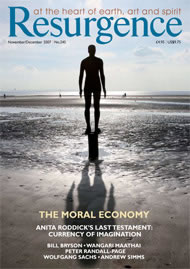AS RECENTLY AS 2005, John Mead reminds us in an essay collected here, the mainstream debate had still not accepted climate change as a reality. And the acceptance of that reality now is in one sense hardly reassuring. Our behaviour in the mass remains largely unaffected. Any journalist or politician worth his or her salt can dash off a declaration of noble Gaian intent before breakfast. The question remains: and?
Or: how do we translate these ever-more alarming data into a new register of thinking and feeling, and do it fast enough to make a difference? “The Gaian worldview will not spread far under current conditions” is the bleak opening sentence of John Turnbull’s analysis here, of how vested interests and economic ideology interact at the personal as well as at the corporate level. His theme is our complicity in the public sphere through the assumptions we don’t question in the private one.
And it is a theme of ‘only connect’ which holds these essays together. Given the urgency of the situation, this book opts for cutting out the journalistic middleman. It goes direct to experienced specialists from the widest possible range of disciplines, to see if light from whatever angle can be shed on how Gaia Theory might find a wider, and deeper, acceptance.
So any lingering doubters on human agency in climate change will find, not yet another summary of a summary of the fourth IPCC report, but a thoughtful piece by Richard Betts, one of its lead authors. Instead of this week’s shock story about the degradation of ecosystems, there is an essay by biologist David Wilkinson about micro-organisms, about all the invisible creatures which become extinct as their environments are destroyed. DNA finger-printing techniques recently investigated “bacteria on the leaves of three species of trees in a Brazilian tropical forest”. The results “implied that there were several hundred bacterial species on these leaves, almost all of which were unknown to science”. True, bacteria don’t exactly invite the ‘flagship species’ treatment, but then neither, the bacteria might say, do we, with our staggering ignorance of what we are wrecking in the name of mahogany garden benches.
Elsewhere, again most un-news-worthily, solutions to an intractable problem on an East African reserve are teased out by conservationist Susan Canney. Competing imperatives – population growth, modern tourism, pastoralism – within parameters such as soil type, rainfall levels, history and local politics, threaten an impasse. Here they are painstakingly re-examined as related elements in a system, to which the slogans of competing factions are worse than unhelpful.
Gaian thought seems here to imply grounding live problems in their immediate physical and cultural context, rather than reducing them to bones of academic or political contention. As Mary Midgley puts it in her introduction, modern physics has long dealt in “various kinds of forces and fields and in webs of connection rather than in separate items to be connected”. Biology is now following suit. And if the scientific and visionary aspects of Gaia have tended to give Westerners “a terrible squint”, this book is meant to help fix it.
“We have thought of ourselves”, since the scientific revolution, “as…active beings detached from the rest of nature and licensed to use it as we please… Now, as we start to see the damage we have unconsciously been doing to the world, our whole image of ourselves has been thrown into confusion.”
This ‘confusion’ will be resolved as much by looking within spiritually as by scientific observation. Anne Primavesi examines Jewish insight into solidarity with the other and the Christian meanings of forgiveness. What application might either or both of these have in the abusive relationship modern humanity has established with the biosphere? David Midgley explores Buddhist ideas of how new beginnings, personal or historical, are brought about by that kind of prayerfulness which is at one with the will to live. Stephan Harding meanwhile looks at Jung’s “four ways of knowing” in a new context.
Genuine science goes to the microbe on the leaf as to the elephant on the savannah. Humbly. And so in matters of self-knowledge we go to our contemporary experience and the best of modern psychiatry as to insights arrived at centuries ago by the mystics. To do all these together is what we are now called to – a Gaian catholicity by which our civilisation might establish a kind of covenant, to replace the current state of war, between modern human consciousness and the planet which gave it birth.







